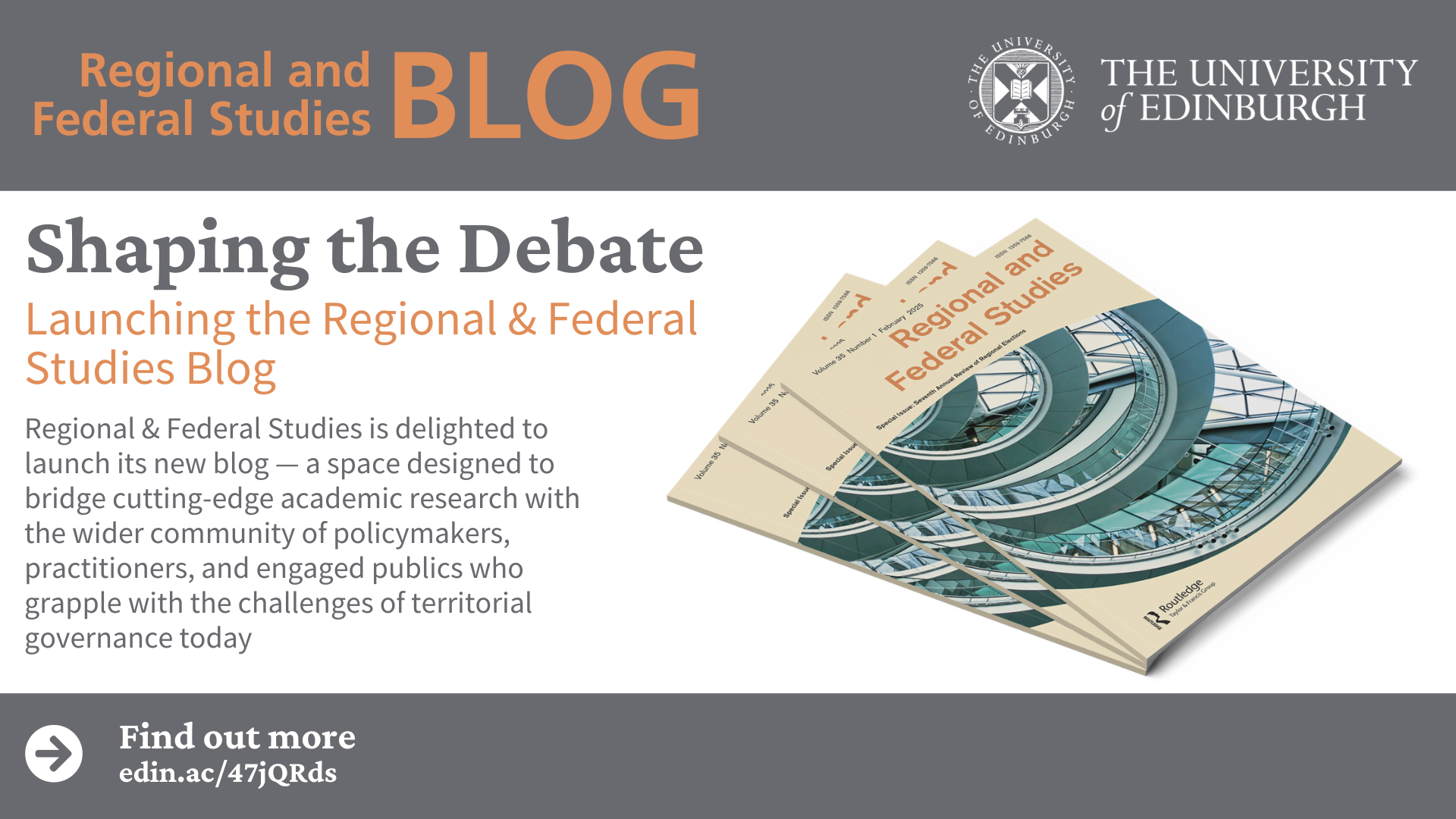Shaping the Debate: Launching the Regional & Federal Studies Blog

By Regional & Federal Studies editorial team
We are delighted to open a new chapter for Regional & Federal Studies with the launch of our journal’s blog. This space will serve as a bridge between cutting-edge academic research and the wider community of policymakers, practitioners, and engaged publics who grapple with the challenges of territorial governance in today’s world.
Our blog begins where our recent editorial left off: by identifying emerging issues and new frontiers in the study of federalism, regionalism, and multi-level governance. As the new editorial team, we inherit a rich legacy of scholarship that has shaped the field for over three decades. Yet the political, social, and economic landscapes of the 2020s and 2030s present new questions that demand fresh thinking and renewed engagement.
Territorial politics in an era of turbulence
From democratic backsliding to climate change, from rising populism to persistent inequalities, the defining challenges of our time all have territorial dimensions. How power is distributed between national, regional, and local levels matters not only for the functioning of democracy, but also for how societies respond to crises, manage diversity, and promote inclusion.
We see several key research directions that will shape the future of the field:
- Institutions under strain: After decades of decentralisation, many states are now witnessing recentralisation pressures, often linked to crises or illiberal turns. Understanding the interplay between centralising and decentralising forces remains central.
- Territorial divides beyond centre-periphery: The urban-rural split and the geography of inequality and discontent now intersect with older cleavages, reshaping electoral dynamics and political mobilisation.
- Parties, movements and representation: Volatile party systems, emerging social movements and the rise of populism are transforming politics at regional and local levels, with profound implications for representation, inclusion, and policy outcomes.
- Policies and intergovernmental relations: Multi-level systems face tough tests in areas such as health, welfare, migration, and climate. Subnational actors may act as policy innovators and political entrepreneurs.
Broadening horizons
We are equally committed to expanding the field’s geographical and methodological horizons. Scholarship on federalism and regionalism has been shaped largely by European and North American experiences. But crucial insights come from Africa, Asia, Latin America, and beyond – regions where territorial governance intersects with state-building, development, and democratic resilience.
Methodological pluralism will remain a hallmark of the journal, and this blog will highlight rigorous research in a clear and accessible way. We welcome contributions that blend quantitative and qualitative insights, comparative and single-case perspectives, and interdisciplinary approaches that push the boundaries of the field.
Towards inclusivity and impact
Our vision is not only academic. Regional & Federal Studies is committed to amplifying underrepresented voices, promoting equity and diversity, and supporting emerging scholars across the globe. This blog will connect key themes from the journal’s published articles with timely commentary on current developments, as well as reflections and reactions from peers – bringing rigorous research into dialogue with live policy debates.
By making complex questions in territorial politics clearer and more engaging, we aim to strengthen exchanges between scholars and practitioners and to highlight the real-world significance of the field.
The future of federalism, regionalism, and multi-level governance is uncertain – shaped by global turbulence, shifting power dynamics, and diverse regional experiences. With this blog, we invite you to join us in exploring these themes. Together, we hope to foster a vibrant and inclusive conversation that reflects the complexity of the world we study and ensures that Regional & Federal Studies continues to lead the way in shaping future research agendas.
Looking ahead: contributing to the blog
To these ends, the Regional and Federal Studies blog welcomes contributions of various types, including:
- Summaries of accepted submissions to the main Regional and Federal Studies journal
- Research-based responses to and reflections on submissions to the blog
- Informed commentary pieces focusing on the themes discussed above
The Regional and Federal Studies blog aims to make the journal’s research accessible to a broad audience, raise its profile, and increase its academic impact. Blog posts should be 800–1,200 words, engaging, evidence-based, and free of excessive technical jargon, with references incorporated via hyperlinks rather than formal citations. Well-presented visuals are encouraged, titles should be narrative and clear, and contributions are coordinated with journal publication where relevant. Submissions undergo editorial review, minor edits for clarity are made, and content is published under a Creative Commons licence, encouraging wide sharing while crediting authors.
If you wish to contribute to the blog, then please contact our Assistant Editor for Communications, Sean Kippin. Sean can be contacted on sean.kippin@stir.ac.uk.